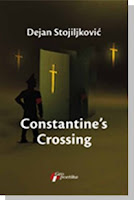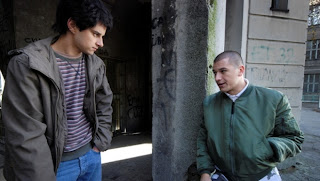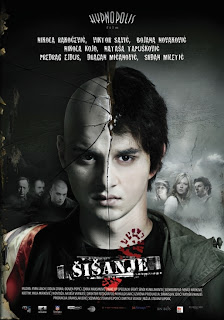Hamam Balkania: A Book Review
 Hamam Balkania from Vladislav Bajac, leading contemporary Serbian author and founder of the Geopoetika publishing house, is described as one of the most exciting and poetic novels in modern Serbian literature. Having won the Balkanika, Golden Hit and Isidora Sekulic awards and been translated into ten languages, it is rare among Serbian novels in that it is so widely available internationally.
Hamam Balkania from Vladislav Bajac, leading contemporary Serbian author and founder of the Geopoetika publishing house, is described as one of the most exciting and poetic novels in modern Serbian literature. Having won the Balkanika, Golden Hit and Isidora Sekulic awards and been translated into ten languages, it is rare among Serbian novels in that it is so widely available internationally.
Using powerful prose, Hamam Balkania is a meticulously structured tale of friendship and redemption, where Bajac considers linkages between issues of personal, individual and national identity in the shadow of dramatic historical events. It also raises the question of how much faith can be placed in history as written by the victors, or even events tainted by the prejudices of our own interpretations.
Belgrade Publisher Promotes Serbian Literature Abroad
 Literature gets under the skin of a culture to reveal truths about people, their feelings and influences on their lives. Books can bypass spin to provide a vivid snapshot on a time, a culture or a community. For me, the thrill of discovering new literature is addictive. I make a point of reading books from countries that interest me or where I have a connection.
Literature gets under the skin of a culture to reveal truths about people, their feelings and influences on their lives. Books can bypass spin to provide a vivid snapshot on a time, a culture or a community. For me, the thrill of discovering new literature is addictive. I make a point of reading books from countries that interest me or where I have a connection.
A barrier can be locating English translations. The range is often limited to big name award winners and firmly established authors, with modern writers missing out on sharing their stories more widely.
I have read many fine books from Balkan authors, particularly from Serbia, a country that can only benefit from a deeper international understanding of its cultural touchstones. But while early 20th century writers such as Ivo Andrić, Danilo Kiš, Meša Selimović and Milorad Pavić have been translated into English, the range of writers from recent decades can be more difficult to get your hands on.
Šišanje / Skinning : A Serbian Film Worth Watching
 Skinning (Srb: Šišanje) tells of high-achieving Belgrade student Novica (Nikola Rakocević), and how he falls under the spell of far right extremism to set off an horrific chain of events. From Serbian director Stevan Filipović, this is a strong film that sticks with you long after the impact of the end credits and their victims roll call.
Skinning (Srb: Šišanje) tells of high-achieving Belgrade student Novica (Nikola Rakocević), and how he falls under the spell of far right extremism to set off an horrific chain of events. From Serbian director Stevan Filipović, this is a strong film that sticks with you long after the impact of the end credits and their victims roll call.
Šišanje / Skinning : Director Had ‘Moral Responsibility’ To Make Movie
 For his second outing as a director, Stevan Filipović has produced an astonishing film addressing Serbia’s issues of ultra-nationalism, alleged church corruption, and society’s lack of accountability – a state he claims he had ‘a moral responsibility to explore and explain‘.
For his second outing as a director, Stevan Filipović has produced an astonishing film addressing Serbia’s issues of ultra-nationalism, alleged church corruption, and society’s lack of accountability – a state he claims he had ‘a moral responsibility to explore and explain‘.
On release in Serbia, the public voted with their feet. In less than a month,Šišanje (English title:Skinning) attracted an audience of 44,000, making it one of the country’s most popular recent films.
Filipović says it is a film that would have been impossible to make even a decade ago, and unimaginable under the Milosovic regime. Even now, it has struck a raw nerve in Serbia where the crew received threats of violence from ultra nationalist groups, the premiere was heavily policed, and right-wingers called it criminal and anti-patriotic.
What cannot be faulted is that this provocative and uncompromising film has achieved something rare: it has held up a mirror and generated healthy and sometimes heated debate. After a private screening at the British Parliament, as part of Serbian Week in Great Britain and attended by the Serbian Ambassador, the film and its context again raised a spirited debate among the Serbian diaspora

